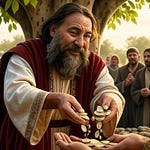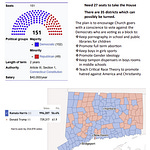
Christmas 2
Jeremiah 31:7-14; Ephesians 1:3-6, 15-19; Psalm 84; Matthew 2:1-12
You can also subscribe to this podcast on Apple, Spotify, or YouTube.
I.
The portion of today’s reading in Matthew that I wish to focus on this morning is the second verse of the second chapter.
Where is he who has been born king of the Jews? For we have seen his star in the East, and have come to worship him.
I repeat these words to you, “We have seen his star in the East.”
Recall now these words from Genesis 3:24,
[The LORD God] drove out the man; and at the east of the garden of Eden he placed the cherubim, and a flaming sword which turned every way, to guard the way to the tree of life.
I want to list for you the implications of this for today’s message. There are three.
The first is that when man was banished from paradise, he was driven by God to the East.
The second is that the tree of life grew in the west, in the garden.
The third is that man’s access to the garden and to the tree of life in that garden has been unnaturally cut off.
Now, let us grapple with the implications of what I’ve just said.
Man is not prevented from returning to the garden to gain access to the tree by lofty mountains or deep rivers, both of which he might eventually be able to scale or ford.
Man is prevented from returning to the garden and gaining access to the tree of life by an angel, a cherubim, who wields a flaming sword.
This is not metaphor, this is not fanciful imagery.
Moses — the author of Genesis and the other four books that begin the Bible — is telling us there is no natural cure for sin.
There is no natural — another way to say it might be scientific — there is no scientific way for man to undo the curse God has put upon him, and not only on him, but on the very ground upon which he walks, and upon the very woman who was given to him as a helpmeet.
To be sure, man, using his faculties to develop the arts and sciences, may learn over time to mitigate the effects of the curse.
He may learn the art of construction to build cities, the science of agriculture to cultivate the land, the art of husbandry to domesticate the animals, and the science of economics to exploit his fellow man.
In doing so, a select handful of Adam’s children — an elite, a nobility — are able to attain an approximation of the life of leisure and ease that Adam enjoyed in paradise.
But this natural working out of the innate talents of man cannot challenge the cherubim and his flaming sword.
The way to the tree of life is closed.
There is no way back. No art or science can achieve it.
Man must die.
II.
But now, many generations after men were first driven east, wise men from the East perceive something new, something unnatural.
Where is he who has been born king of the Jews? For we have seen his star in the East, and have come to worship him.
Does it make sense that this star was a natural star, that it was one of the “lights in the firmament of the heavens” of Genesis 1:14?
Many have thought so.
They tell us that the wise men were Chaldeans, Magi, ancient astrologers, and that they had cast horoscopes and understood that a king had been born.
But I reject this interpretation for two reasons.
First, God does not reveal Himself in occult ways.
That is to say, God, who is already hidden from our mortal eyesight, does not further obscure Himself when He chooses to reveal Himself.
When He shows Himself, He shows us a visible pillar of fire and storm cloud.
When He speaks, He speaks boldly from that same fire, a burning bush, saying, “I AM WHO I AM.”
We may not quite understand what we are seeing, we may not comprehend what we are hearing, but we are certain that we are seeing and that we are hearing.
No, it simply won’t do to say that God revealed himself to these wise men by their dark arts and superstitious science.
You remember that I said that man has been cut off — naturally cut off — from the tree of life, therefore no amount of natural art and science will bring him back to Eden.
It certainly won’t prompt a group of wise men to start off on a fool’s errand to the west, where they know Eden once was.
The second reason I reject this interpretation is the behavior of the star itself.
It does not behave like a star of creation.
It does not move in a regular way. It stops and starts and moves where it pleases.
The wise men could tell this much by their astrology: this was no star of the Zodiac.
This star was not natural.
It was not of this creation.
It came from above this creation.
Matthew tells us the star is His star. “We have seen his star in the East,” the wise men tell Herod, “and have come to worship him.”
The star can only be one thing.
It is a messenger of the Lord.
Perhaps the star is not the same cherubim who once guarded the gates of paradise with a flaming sword, but it is clear that the star is an angel — remember angel means messenger — the star is a messenger come with a message to the men of the East: “Come back to Eden.”
“Come and sing aloud on the height of Zion,” Jeremiah 31:12 tells these and all wise men, for Zion is another name for Jerusalem, that city built on the mountain of the LORD, where Eden itself had been symbolically rebuilt in the temple.
“Come to Jerusalem. Come back to Eden. The royal way is now open. The king has been born.”
III.
Where is he who has been born king of the Jews? For we have seen his star in the East, and have come to worship him.
Herod was troubled by this question, and Matthew tells us “and all Jerusalem with him.”
He dispatches the wise men to Bethlehem to be his secret emissaries.
“Go and search diligently for the child,” he says, “and when you have found him bring me word, that I too may come and worship him.”
But worship is not a private thing, now, is it? Yes, I know you can pray in solitude, Jesus Himself often did so.
But worship, worship is a public thing. It is a congregational thing. It can only be done when the church is gathered.
Even the ancient pagans knew this.
After all, it wasn’t for praying privately that Daniel and his friends were thrown into the lion’s den.
It was for refusing King Nebuchadnezzar’s command to worship the golden image he set up publicly.
It was the king’s command that “whoever does not fall down and worship shall immediately be cast into a burning fiery furnace” (Daniel 3:4-6).
Herod’s response is different. He is troubled, and all Jerusalem with him.
The birth of the Messiah is public knowledge. Herod assembled all the chief priests and scribes of the people. The prophecy is confirmed.
And you, O Bethlehem, in the land of Judah, are by no means least among the rulers of Judah; for from you shall come a ruler who will govern my people Israel.
But no public command to worship the new-born king is given.
Instead, Herod summons the wise men in secret to learn more about this unnatural star and its message.
Then, he will come and worship the newborn Christ privately and alone, king-to-king.
After all, true worship is a private affair, isn’t it?
Here, Herod models all those down through the ages who tell us that:
“Going to church doesn’t matter.”
“Buildings don’t matter.”
“It’s just an empty ritual.”
“I can worship God in my heart, in my own way, when I take a walk in the woods, or go for a stroll on the beach.”
Herod will issue no public decree. He will not command the chief priests and the scribes and the people to render homage to the Christ-child.
Herod’s evil intent is clear, and an angel makes it clear to the wise men as well. They are warned in a dream not to return to Herod, but to go home, and take a different route.
IV.
Herod is troubled and Jerusalem is troubled, but he tries to handle the matter privately.
Through His prophets, God has been publicly announcing what He will do for centuries, that He will send the Messiah to save His people.
Now God is doing it. Christ has been born. The Gentiles have gotten the news, and they are on the move.
Herod is no fool. This could open up wonderful business opportunities. Jerusalem could be more important than ever.
Perhaps — though he barely allows himself to think it — more important than Rome.
But Herod could lose his own throne, to say nothing of his life, if these dangerous developments continue unchecked.
You see, Herod is apathetic, and all Jerusalem with him. The status quo is good enough. “The mountains are high, and the emperor is far away,” an old Chinese proverb says.
And isn’t that the way many churches think, many individual Christians as well?
Christ offers the cure for sin, but do you really want to take it?
Many of us are quite content to study a problem endlessly but seldom move decisively to solve it.
And what about congregations and associations and conferences and denominations as a whole?
The Spirit descends, the gospel is preached, and a dying church begins to grow…
…but someone will invariably point out that the old wineskins are very important, that we’ve had them laid up for a very long time, and that if you put new wine into an old wineskin, the old wineskin will burst (Matthew 9:17; Mark 2:22).
But God is not trying to save the old wineskins. He wants us to drink the wine that’s in them!
V.
That’s why God needs to warn us, like He warned the wise men in a dream, “Do not return to Herod.”
Jerusalem’s being troubled at the news of the birth of Christ foreshadowed her trouble with Jesus the man when He came to her as an adult.
The warning was obvious to any contemporary reader of Matthew’s Gospel: do not be like Jerusalem. Do not be troubled by Christ a third time, before His return. Use the time you have wisely.
Today, we don’t have to scrutinize any unnatural sign and puzzle over what it means or where it might take us.
We don’t need to ask any king or his chief priests and scribes where Christ is or for their permission to go and worship Him.
We know. We know that He has ascended bodily into heaven and that He has left a complete revelation of His testimony for us in the Bible.
The revelation is complete, and perhaps just as important, it is clear, it is something we can understand, and so we cannot remain in or return to ignorance. (We have no excuse if we do.)
Likewise, we should not be troubled when we hear of Him, when we hear that Jesus has come, when we hear Him standing at the door of our hearts, knocking (Revelation 3:20).
You see, Herod’s troubled mind and Jerusalem’s troubled mind were born of guilt (and the apathy that comes with guilt) because any change to their carefully managed status quo meant that judgment was one step closer, or that the dreadful day had finally arrived.
The only trouble we should allow ourselves to feel is trouble enough to rouse us from our apathy towards our sins.
Let us be troubled enough by them not to return to them. “Do not return to Herod!” is a warning for us as well.
Then, let us get up and go, all of us who were banished to the east of Eden.
Let us return and bring Him gifts, not of gold, frankincense, and myrrh, but of repentance, faith, and love.
Let us pray:
O God, who by the leading of a star didst manifest thy only-begotten Son to the peoples of the earth: Lead us, who know thee now by faith, to thy presence, where we may behold thy glory face to face; through the same Jesus Christ our Lord, who liveth and reigneth with thee and the Holy Spirit, one God, now and for ever. Amen.
Preached on January 5, 2025 at the First Congregational Church, Woodbury, Connecticut.
Questions for reflection and discussion:
Man was driven out of Eden and to the ____________.
Man is prevented from returning and gaining access to the tree of life by an ____________, a cherubim, who wields a flaming sword.
This tells us that there is no ____________ cure for sin and the curse.
Wise men from the East perceive something new, something ____________.
God does not reveal Himself in ____________ ways.
The star does not behave like a star of ____________.
Herod was ____________ by the wise men’s question.
Worship is a ____________ thing.
Herod summons the wise men in ____________.
Herod and Jerusalem are troubled. This reveals their ____________.
Today, we don’t have to scrutinize any unnatural ____________ and puzzle over what it means.
This is because the ____________ is complete, and perhaps just as important, it is clear.
Parents and Grandparents, you are responsible to apply God’s Word to your children’s lives. Here is some help. Young Children – draw a picture about something you hear during the sermon. Explain your picture(s) to your parents or the minister after church. Older Children – Discuss with your parents one or both of the following: 1) Describe something you used to care about but don’t anymore. What might make you start caring about it again? 2) Describe a message you got that was cryptic or hard to understand. Were you ever able to figure out what it meant?
(1) east; (2) angel; (3) natural; (4) unnatural; (5) occult; (6) creation; (7) troubled; (8) public; (9) secret; (10) apathy; (11) sign; (12) revelation











